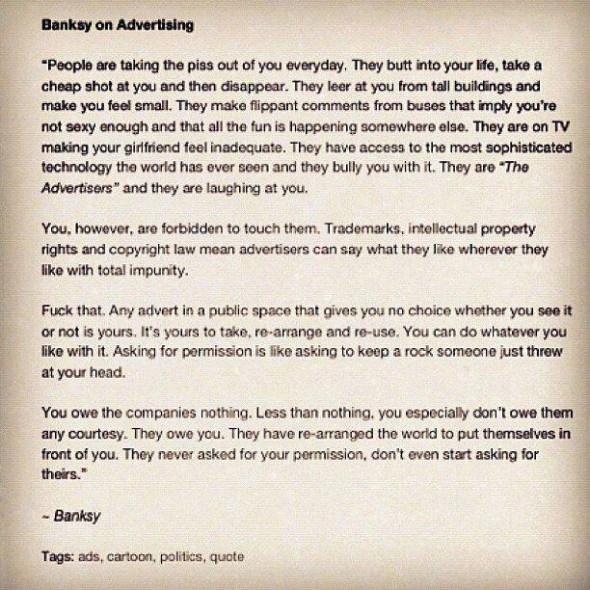It’s hip, especially in the ad world, to dig, laud, enshrine, lionize and bestow sainthood upon the British graffiti artist known as Banksy. Of course, as anyone can judge simply by looking at the way I dress, being hip has never been one of my life’s chief priorities. I’ve never been on the Banksy bandwagon, but I’ve never been particularly anti-Banksy, either. A lot of his work is actually quite interesting, but I just didn’t care that much about what a dilettante with a can of Krylon had to say about life’s weightier issues. Sorry for being so Midwest.
Then yesterday, I saw this:
I don’t know if it’s really new or not, but I was unable to find any older links or mentions, so I’ll have to treat it as such. This rant against the tyranny of advertising amuses me for a couple of reasons:
First, it shows a complete lack of understand of basic copyright law. Trademarks and IP laws do not give anyone, let alone more highly regulated advertisers, the right to say whatever they want wherever they like at any time. It gives the right to protect what they say and create from unauthorized appropriation. It’s all well and good if Banksy want to give away his designs and work – more power to him. But that doesn’t mean we should all work for free. Not even corporations.
Second, Banksy’s assertion that anything that appears in the public space becomes public property is terribly misguided. By this argument, if I let people see something, they have the right to take it. Sorry, but there’s a difference – a very important difference – between something being in public and something being public. Advertisers, by and large, pay for their ad space. If you don’t like where it appears, complain to the people who sold them the space. Boycott their buildings or buses or whatever. Raise a stink about billboards blocking your view of the trees. But to suggest that something broadcast to the public now belongs wholly to the public is absurd.
Third, Banksy does exactly what he accuses “The Advertisers” of doing – forcing people to look at his work whether you want to or not. Does he ask everyone who passes by one of his works if it’s okay that he’s forcing their eyes to see it? Or is the fact that his work is of such a supposed higher moral and philosophical value than commercial messages that the comparison is invalid? That was sarcasm, by the way.
But then, who am I to judge? I’ll never as famous as Banksy. There will be no Hanksy equivalent of my ramblings or ads. But then, my goal isn’t to Say Something Important. My goal is just to leave the world a better place for my kids. Which includes the right to profit, or not if they choose, from their own creativity.
How square is that?
Later,
Fox
